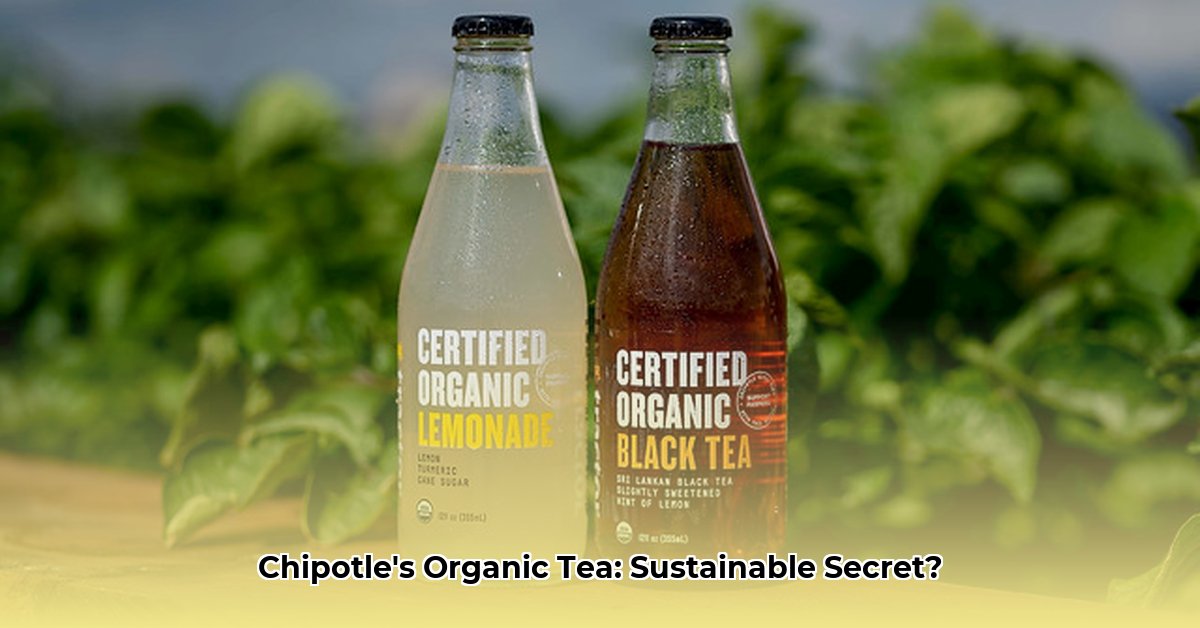
Tractor Organic Black Tea and Chipotle: A Case Study in Sustainable Sourcing
Chipotle Mexican Grill's partnership with Tractor Beverages, featuring organic black tea infused with a hint of chipotle pepper, represents a significant foray into sustainable sourcing within the fast-food industry. This case study analyzes the partnership's successes, challenges, and implications for the future of ethical and sustainable food production. Learn more about Tractor's farming practices here.
Sustainability Beyond Marketing: Assessing the Impact
The partnership leverages Tractor Beverage's commitment to organic farming, aligning with Chipotle's growing customer base increasingly concerned about environmental and social responsibility. The use of all-natural ingredients reinforces this image. However, a critical question remains: Is this a genuine commitment to sustainable practices, or a clever marketing strategy? The partnership's success depends on transparency and verifiable data. A key component of the agreement is Chipotle's pledge to share 5% of the tea's profits directly with the tea leaf farmers. This profit-sharing model aims to ensure fair compensation and cultivate long-term relationships. However, the precise number of farmers benefiting and the detailed mechanisms for profit distribution require further clarification to ensure complete transparency.
Strategic Planning: Short-Term Tactics and Long-Term Vision
The partnership's success hinges on a balanced approach encompassing short-term tactical goals and a well-defined long-term vision.
Short-Term Goals (Year 1):
- Market Penetration: Expand the tea's availability across a larger network of Chipotle locations.
- Sales Analysis: Rigorously monitor sales data to optimize product placement and distribution strategies.
- Enhanced Communication: Effectively communicate the partnership's sustainability aspects to consumers, emphasizing the ethical sourcing story.
Long-Term Vision (Years 2-5):
- Environmental Impact Assessment: Conduct a comprehensive Life Cycle Assessment (LCA) to quantify the tea's environmental footprint from farm to consumer.
- Expanded Profit Sharing: Explore the possibility of extending the profit-sharing model to other agricultural suppliers beyond tea farmers.
- Farmer Well-being Metrics: Develop measurable indicators to assess and track the well-being and resilience of the farming communities involved.
Navigating Challenges and Mitigating Risks
Despite the partnership's potential, several significant challenges pose risks to its long-term success.
Challenges:
- Price Volatility: The fluctuating prices of organic goods can significantly impact profitability and necessitate robust risk mitigation strategies.
- Evolving Consumer Preferences: Adaptability is crucial to respond to changing consumer demands and maintain market relevance.
- Scalability: Expanding the partnership's scope and impact requires careful planning and efficient infrastructure development.
Risk Reduction Strategies:
| Risk Factor | Likelihood | Impact | Mitigation Strategy |
|---|---|---|---|
| Price Volatility of Organic Goods | Medium | High | Diversify sourcing; negotiate long-term contracts; explore price hedging options. |
| Shifting Consumer Preferences | Medium | Medium | Continuous market research; agile product adaptation; build strong brand loyalty. |
| Scalability Issues | High | High | Strategic partnerships; phased expansion; robust infrastructure development. |
Regulatory Compliance and Legal Considerations
Adherence to organic certification regulations, food safety standards, transparent labeling, and truthful advertising are paramount to avoid legal complications. Compliance with the specific regulations governing the tea's origin and processing is also essential.
Actionable Intelligence: Replicating Chipotle's Success
Chipotle's approach to sustainable sourcing offers valuable lessons for other businesses aiming to create ethical and environmentally responsible supply chains. The key to replicating their success lies in a multifaceted strategy:
- Strategic Partnerships: Cultivate strong relationships with farmers committed to sustainable practices, prioritizing shared values and mutual benefit.
- Fair Compensation Models: Implement fair and transparent compensation structures, such as profit-sharing, to incentivize sustainable farming practices and foster long-term collaboration.
- Technological Investment and Training: Provide farmers with access to advanced technologies and training programs to enhance efficiency and sustainability.
- Data-Driven Decision Making: Develop robust metrics to track and assess the environmental and social impact of the partnership, using data to inform strategic decisions and ensure accountability.
- Transparent Communication: Clearly communicate sustainability initiatives to consumers, building trust and enhancing brand reputation.
The Chipotle-Tractor partnership remains a work in progress. Its ultimate success hinges on addressing the identified challenges and maintaining a steadfast commitment to transparency and accountability. Ongoing research and data analysis will be crucial in determining the long-term environmental and social impact of this initiative. The partnership serves as a valuable case study, highlighting both the opportunities and challenges inherent in building sustainable supply chains within the fast-food sector.